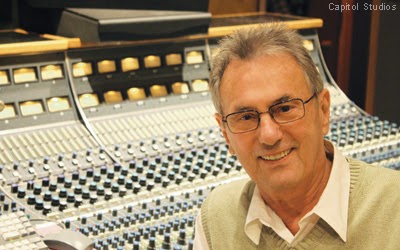Do you use the same setup every time?
I usually start out with the same microphones. For instance, I know that I’m going to immediately start with a tube U 47 about 18 inches from the F-hole on an upright bass. That’s basic for me and I’ve been doing that for years. I might move it up a little so it picks up a little of the finger noise. Now if I have a problem with a guy’s instrument where it doesn’t respond well to that mic then I’ll change it, but that happens so seldom. Every once in a while I’ll take another microphone and place it up higher on the fingerboard to pick up a little more of the fingering.
The same with the drums. There are times where I might change a snare mic or kick mic, but normally I use a D-112 or a 47 FET on the kick and a 451 or 452 on the snare and they seem to work for me. I’ll use a Shure SM57 on the snare underneath and I’ll put that microphone out of phase. I also mic the toms with 414’s, usually with the pad in, and the hat with a Schoeps or a B&K or even a 451.
What are you using for overhead mics?
I do vary that. It depends on the drummer and the sound of the cymbals, but I’ve been using M 149’s, the Royer 121’s, or 451’s. I put them a little higher than the drummer’s head.
Do you try to capture the whole kit or just the cymbals?
I try to set it up so I’m capturing a lot of the kit, which makes it a little bigger sounding overall because you’re getting some ambience.
What determines your mike selection?
It’s usually the sound of the kit. I’ll start out with the mics that I normally use and just go from there. If it’s a jazz date then I might use the Royers and if it’s more of a rock date then I’ll use something else.
How much experimentation do you do?
Very little now. Usually I have a drum sound in 15 minutes so I don’t have to do a lot. When you’re working with the best guys in the world, their drums are usually tuned exactly the way they want and they sound great, so all you have to do is capture that sound. It’s really pretty easy. And I work at the best studios where they have the best consoles and great microphones, so that helps.
I don’t use any EQ when I record. I use the mics for EQ. I don’t even use any compression. The only time I might use a little bit of compression is maybe on the kick, but for most jazz dates I don’t.
How about mic preamps? Do you know what you’re going to use? Do you experiment at all?
I know pretty much what I’m going to use. I have a rack of Neves that I’ll use on the drums.
How do you handle leakage? Do you worry about it?
No, I don’t. Actually leakage is one of your best friends because that’s what makes things sometimes sound so much bigger. The only time leakage is a problem is if you’re using a lot of crap mics. If you get a lot of leakage into them, it’s going to sound like crap leakage, but if you’re using some really good microphones and you’re get some leakage, it’s usually good because it makes things sound bigger.
I try to set everybody, especially in the rhythm section, as close together as possible. I come from the school when I first started where there were no headphones. Everybody had to hear one another in the room, so I still set up everybody up that way. Even though I’ll isolate the drums, everybody will be so close that they can almost touch one another."
To read additional excerpts from The Recording Engineer's Handbook and my other books, go to the excerpts section of bobbyowsinski.com.
----------------------------------



No comments:
Post a Comment